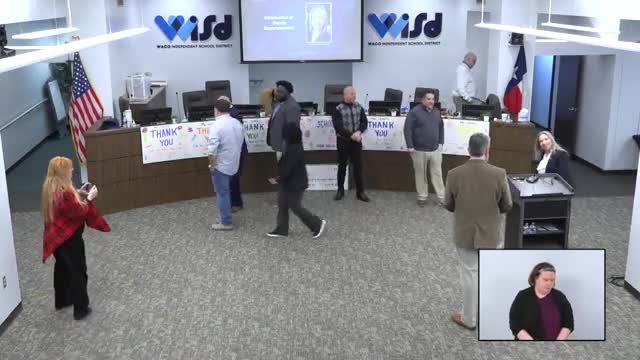Public hearing: Waco ISD reports TEA 'needs intervention' special‑education determination; trustees review academic indicators
Get AI-powered insights, summaries, and transcripts
Subscribe
Summary
At a public hearing trustees heard the Texas Academic Performance Report (2324) for Waco ISD: the district’s special‑education determination status is 'needs intervention' and the presentation included STAAR performance trends, chronic absenteeism improvements and graduation/CTE metrics.
WACO — The Waco ISD Board of Trustees opened a public hearing on the campus‑level and district academic performance report for the 2023‑24 school year and were told that the Texas Education Agency (TEA) placed the district’s special‑education determination status at “needs intervention.”
Miss Steele (district assessment/data) reviewed the Texas Academic Performance Report (TAPR) data, saying the TAPR includes lagging data and that Waco ISD has not received district A–F letter ratings for two years because of pending litigation. The special‑education determination flagged areas including academic performance, post‑secondary readiness and disproportionality for students receiving special education services.
Steele walked trustees through comparative STAAR data for reading, math, science and social studies across approaches/meets/masters levels. She noted that Waco ISD’s performance trends generally tracked state movements (district increases when the state increased, decreases when the state decreased) and described how changes to STAAR item types and online administration in 2023 and 2024 complicated year‑to‑year comparisons.
Trustees pressed staff on growth expectations and the stability of the assessment system. Staff said TEA has changed tests and scoring in recent years and that it remains unclear whether the assessment will stabilize soon; trustees urged legislative advocacy around testing and funding.
Steele reported non‑assessment indicators: chronic absenteeism decreased by 10% between the 2021‑22 and 2022‑23 reporting windows; the district showed improvements in attendance and had a small increase in dropout figures for grades 9‑12. On graduation and college‑career‑military readiness (CCMR), Steele said the class of 2023 saw improvements in several measures and that 53% of 2023 graduates were CTE completers (state 31%). She explained that rules for counting CCMR and industry‑based certifications have changed year to year, affecting comparability.
Trustees also asked about services for students with dyslexia, non‑categorical early childhood identification, and how special education and dyslexia services will be categorized going forward. Staff said changes in eligibility and coding are expected to increase special‑education counts in coming reports.
No action was required; the data presentation is part of the public record and will inform future district strategy and reporting.
